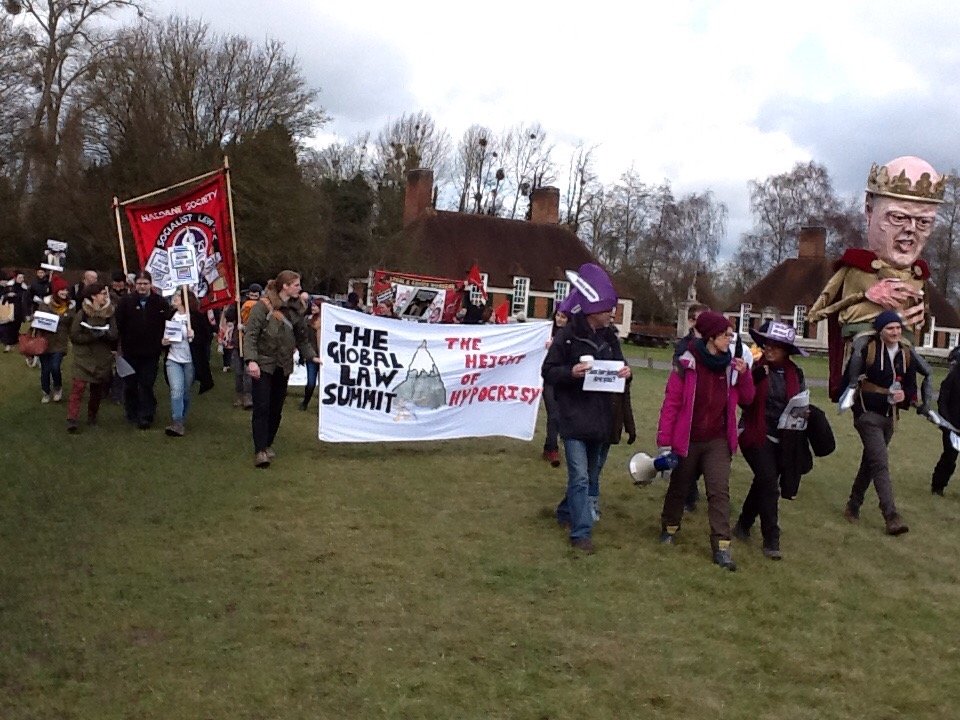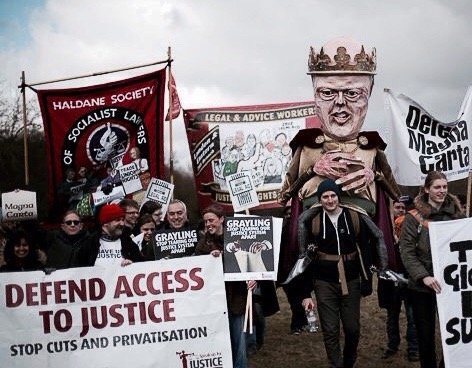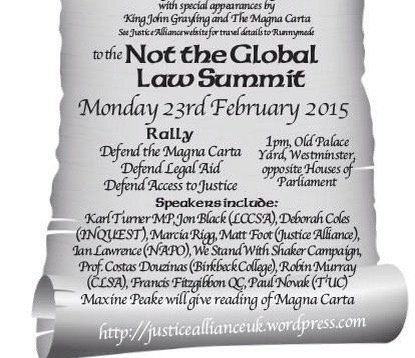Who is Chris Grayling?
Born on April Fools Day, Christopher Grayling MP (Conservative MP for Epsom) was the Justice Secretary and Lord Chancellor from October 2012 to May 2015. He was the first non-lawyer to have served in that post.
This blog reviews Grayling’s tenure in office as Lord Chancellor.
Introduction and Overview
Overview here (my TV interview about Grayling, Legal Aid and Magna Carta, via YouTube)
Joshua Rozenberg assessed Grayling’s likely legacy In the Law Society Gazette here (March 2015)
Grayling “just didn’t get it” – article in Gazette here (November 2015)
Top ten things about which Grayling was wrong and why (Mirror, Nov 14)
Why “Failing Grayling” illustrates the worst aspects of Cameron’sGovernment (by Nick Cohen in the Spectator, Dec 2014)
2014 review of a year in the life of Christopher Grayling (with links) as reported in the “Tuesday Truth” blog.
EXPENSES (pre-appointment)
Chris Grayling as an MP and certainly as Lord Chancellor purported to want to cut public expenditure. However, when it comes to his own public expenditure, Chris likes to get as much of it as he can. The extent of his guzzling was chronicled in the Telegraph expenses scandal here (as shadow home secretary h3 claimed thousands of pounds to renovate a flat in central London – bought with a mortgage funded at taxpayers’ expense, even though his constituency home is less than 17 miles from the House of Commons)
Chris neeed a good secretary, so the taxpayer forked out for him to have a secretary (at an eye-watering 40k pa) . Luckily, someone was available for the job- no need to advertise! The ideal candidate? Step forward Mr Graylings wife- susan!
Years later, how Grayling get away with it, and whether he did in fact refund some of the money as he publicly pledged , remain shrouded in mystery (as explained by Ian Dunt in this article, Jan 2017)
Grayling and cuts to criminal legal aid
Grayling had supported, despite overwhelming opposition in the preceding “consultation, a new model for payment of criminal league aid solicitors known as Price Competitive Tendering, which was so flawed even the Mail on Sunday criticised it ( enjoy this Downfall parody video with Grayling stabbed in back by MoS ) Legal Aid had already been cut to the bone, before Grayling set to work with cuts to all areas of legal aid.
Criminal Lawyers even went on “strike” (January 2014) Grayling did not back down, the LCCSA took legal action, and a year later (under Grayling’s successor) the Government caved in and the scheme was abandoned.
Government guidance in relation to the granting of legal aid for immigration cases was found to be unlawful (Dec 2014)
Meanwhile as more defendants were appearing unrepresented, even Magistrates started commenting on the “threat to Justice” (full story and my quote in The Independent here) (January 2015) and more detail here (via the Bureau of Investigative Jouralism)
Grayling attracted criticism even on Tory blog “Conservative Home”- see this demolition of Grayling’s Legal Aid Cuts (“damaging and unfair”, Feb 2015)
Grayling and cuts to other areas of legal aid
The supposed “safety net” introduced for exceptional cases was revealed in this article to be a failure (Daily Mirror 28/12/15)
Grayling repeatedly claimed that Legal Aid in the UK is “the most expensive in the World” -an inacuracy also repeated by the MoJ but demolished here
His LASPO Residency test was overturned in July 2016 (see here)
PRISONS CRISIS
Guardian article on rising suicide figures exposing prison crisis, and subsequent letters.
The Independent reports on Grayling callous indifference to rising suicide rate
An insider account of the “Highdown 11” (prison protesters against prison cuts all acquitted)
Lord Ramsbotham speaks out against Grayling over the prison suicide crisis.
Grayling makes Chief Prison Inspector reapply for his job.
Grayling dismisses huge increase in prison suicides as a “blip“.
Grayling’s legacy will be to have left prisons in a worse state than he found them.
After cancelling an effective rehabilitation course, Grayling was described as an “incompetent, short-sighted recidivist” (The Guardian, April 2015)
Grayling was criticised in a parting shot from the outgoing Prison Inspector here (the Indy, Jan 2016)
Prisoner Book Ban
Grayling’s book ban, and and the Howard League’s response
Authors use Chris Grayling as villain in response to the book ban.
“Strange and absurd” -Court Judgement on Grayling and the book ban.
Picture: demo against book ban outside Pentonville prison:
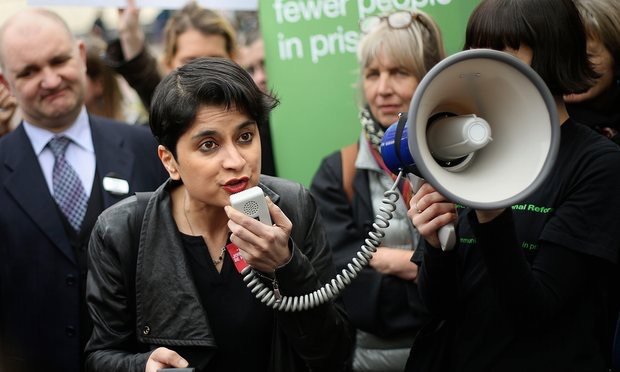
Having lost on his prison- book-ban, Grayling delays implementation and is described as “stealing Christmas“.
A short Video of the book ban demo outside Pentonville prison, March 2014
Grayling and Human Rights
The sad truth is, Grayling doesn’t actually understand Human Rights, and even the Daily Mail had to correct him- see this article.
Grayling’s views on workfare and making employees work for free here (New Statesman 2012)
GRAYLING AND THE MOJ
Man wrongly imprisoned for 17 years persued for costs by MOJ
Under Grayling’s tenure, there were record levels of absenteeism as MoJ staff were sick with stress and mental health issues (as reported here)
Grayling gets MOJ “flogging expertise to Saudi floggers” -selling legal services to Saudi Arabia and other repressive regimes. (As set out by David Hencke, Jan 2015)
The MOJ “deal” with the Saudi regime represents a clear conflict of intetest as set out by Jack of Kent in his informative argument. Gove has done his best to extricate the MOJ from Grayling’s toxic legacy -update here.
The commercial arm also managed to make a £1million loss! Detail here
Grayling and Magna Carta
BACKGROUND:- this website has info about Magna Carta, it’s historical significance then and now, why we should celebrate it and how the Government has hypocritically hijacked the anniversary.
Nothing but lip-service, is all we can expect from this Lord Chancellor
Grayling is a hypocrite with his MOJ event to commemorate Magna Carta (argues Peter Oborne) – don’t jump on the bandwagon!
Robin Murray spells out the hypocrisy and called for a boycott of Grayling’s Magna Carta event.
More here on why principled lawyers would not attend.
Frank Magennis in the Justice Gap described this as an unfolding of British Justice (published Feb 2015)
In the 800th anniversary of Magna Carts (see below) a RELAY FOR RIGHTS saw demonstrators walk from Runnymede to Westminster to protest against Christopher Grayling and his preposterous, hypocritical “Great” Legal Summit. This led to a public Impeachment for the man masquerading as Lord Chancellor.
See also this article on Grayling and Magna Carta in the New Statesman (Feb 2015) by Anthony Barnett.
Grayling and the Probation Service
Grayling was accused of no less than murdering the probation service
Grayling’s privatisation has led to job losses and failure (article in the Independent December 2015)
Grayling’s failings revealed Probation reforms deemed a costly disaster by NAO in this scathing report (2019)
Grayling and Judicial Review
JR bill falls apart after grayling admits misleading Commons
The Lord Chancellor lost yet another judicial review in October. This time it was over his decision to make mesothelioma sufferers pay up to 25 per cent of their compensation for legal and insurance costs should they win their case. Giving his judgment in the High Court, Mr Justice Williams said: “No reasonable Lord Chancellor faced with the duty imposed on him by section 48 of the Act would have considered that the exercise in fact carried out fulfilled that duty. This is not a case in which the procedural failure was minor or technical in nature.”
Grayling in his own words
in this article we find out what Grayling thinks , with critical analysis.
Grayling as Lord Chancellor
Former Tory MP, barrister and blogger Jerry Hayes described Grayling as “a shit that has to be flushed after the election”
Matthew Norman, writing in the Independent, (Jan 2015) asks “what in Sanity’s name is Chris Grayling doing in the job of Lord Chancellor?”
Minutes of Grayling’s appearance as Lord Chancellor before the Justice Select Committee here. Note the admission to Jeremy Corbyn that cuts are “ideological” (Q200)
Grayling on Twitter
You can find out more about Mr Grayling by searching #FailingGrayling
Musical Grayling
Check out the chris Grayling playlist
Freedom of Information
Naturally Grayling is not a fan (source:Guido)
Lord Chancellor Grayling In Retrospect
Has there ever been a more incompetent minister than Grayling? Answer in this article in Huffington Post
Unfavourable comparison with his successor here in the Spectator.
Lord Pannick described Grayling’s performance as “notable only for his attempts to restrict judicial reviews and human rights, his failure to protect the judiciary against criticism from his colleagues and the reduction of legal aid to a bare minimum.”
Grayling Brexit
After the May 2015 election, Grayling let it be known that he would be very happy to stay on as Lord Chancellor. He was promptly demoted by Cameron to “Leader of the House”. The New Statesman asked “Is Grayling the most incometent Minister?” (article December 2015) “It’s often said that all political careers end in failure, it just seems that Grayling’s seems to be failing before it has ended…”
For many months we heard nothing about Grayling. Then it emerged he had been granted permission to campaign in favour of Britain leaving the EU in the forthcoming referendum, and he became a self appointed leader of Brexit. Grayling’s support for “out” caused celebrations in the “in ” camp, as Grayling (a “sheep in sheep’s clothing”) proved that he has “yet to discover an argument he has consciously been on the right side of” (read the full sketch by John Crace 14/01/16) However, as we now know, the Country did vote to Brexit, although few have cited Grayling and his support as having been an influential factor in that.
One of his first speeches in the cause showed his “humorous side” as described in this article 50 shades of Grayling (Political sketch by Patrick Kidd, Times, January 2016)
Post MOJ: Grayling as Leader of the House
We didn’t hear much of or about Grayling after his demotion from Lord Chancellor, other than his legacy being unravelled and overturned by his successor, and his Brexit campaign (above). However, never one to be on the right side of an argument, he sought to with-hold details of MPs dodgey expenses and arrests (as outlined here in the Daily Mirror (Feb 2016)
From Jail to Rail: Grayling as Transport Secretary
Grayling was appointed transport secretary in Theresa May’s new cabinet (July 2016)
Two weeks later there were 16 hour delays in traffic jams leading to Dover…
He combined his newfound interest in Brexiting and Transport with an important intervention in Public Life-railway platforms. Mr Grayling is however wrong even about the Brexit dividend to station platforms as explained here
Meanwhile, as controversy mounts over heathrow expansion and HS2, Chris struggles to find any relief for the long-suffering commuters reliant on failing Southern Rail. He is then “offered a new job by a Village without an idiot”, according the satirical website NewsThump here
in December 2016 there are calls for his resignation even from Tory MPs (see this BBC News item)
In 2017 Grayling supported Heathrow expansion, and Monarch Airways went bust.
In October 2017 Grayling attending the launch of the new hybrid train between Bristol and London. A service that not only arrived into Paddington 45 minutes late after the train broke down while switching from diesel to electricity, but whose air conditioning had failed, drenching dozens of passengers with water.
As for Brexit, he says that everything will be fine because “British farmers will grow more”, a comment so facile it is beautifully eviscerated in this must-read demolition of Grayling’s ignorance which describes him as “the wilfully ignorant, insouciantly callous former Justice Secretary who took a sledgehammer to the legal aid and prison systems” (independent)
He also appeared before the Transport Select Committee, in a shambolic performance that was beautifully captured in this sketch (worth reading in full- concludes with “while there was a refreshing honesty to his incompetence, there really didn’t seem to be any part of his brief that Grayling fully grasped. He was dangerously deluded about what had gone on on his watch and complacent about the here and now”
Grayling’s short tenure as Conservative party chair
On 08 January 2018 in Theresa May’s botched cabinet re-shuffle, Conservative HQ tweeted congratulations to Grayling on a post that he had not in fact been given, as described here https://www.standard.co.uk/news/politics/chris-grayling-named-as-new-tory-party-chairman-in-now-deleted-tweet-in-cabinet-reshuffle-blunder-a3734531.html
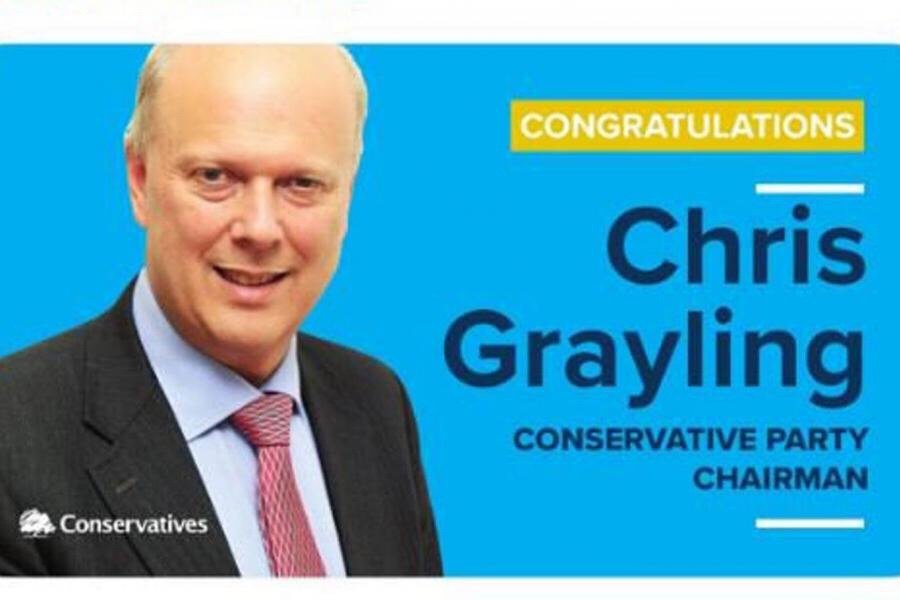
That it took nearly half a minute to realise the mistake was a surprise: most people don’t need nearly that much time to work out that Grayling is invariably the wrong person for any job.
More transport shambles
Grayling was trending again on twitter (and not in a good way) in June 2018 after ongoing train cancellations and timetable shambles. Chris was supposed to meet MPs but had to cancel some meetings after he didn’t timetable them properly (I’m not making this up) and then gave a statement in the house where he said that those responsible should resign.
“It’s completely unacceptable to have someone operationally in control and not taking responsibility,” Failing Grayling declared hysterically. At that moment, satire died. (Full sketch by John Grace here, and here is a further extract: If you were writing a new series of The Thick of It, you’d hesitate to create a character like Chris Grayling for fear no one would believe in him. Even in the current cabinet, a confederacy of dunces where the sole qualifications for membership are being a bit dim and entirely incompetent, the transport secretary is a class apart.
To say that Failing Grayling has more than his fair share of bad days is a category error. Because that implies he has the occasional good one. He doesn’t. Every day is a desperate, losing struggle against the chaos caused by his own hopelessness. But even for a man who has turned his failure into a monumental work of performance art, Monday hit a new low. Or, as Grayling might see it, a total triumph. The moment he formally achieved the coveted status of the idiot’s idiot.
The Times has this to say 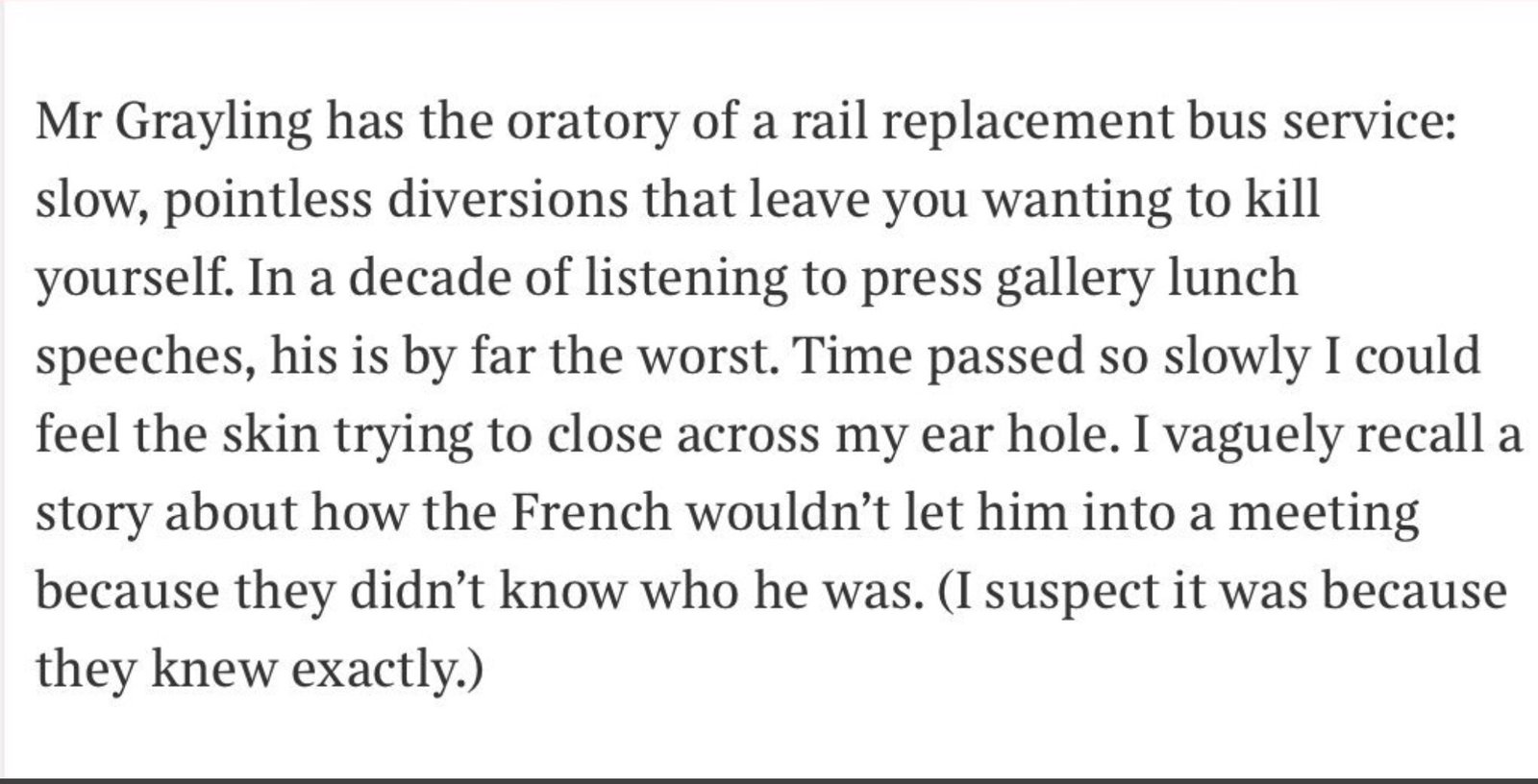
Chris Grayling used the publicly owned French railway as an example of how bad a UK nationalised railway would be…yet we pay the French rail to run private UK services and UK fares can be 4x more expensive for similar journeys.




